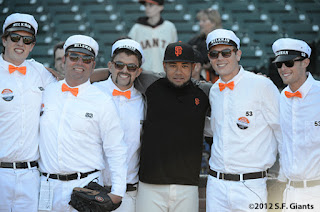Few
directors working today have developed as distinctive a style as Tarantino.
When you walk into one of his movies or pop one into the ol’ DVD player, you
pretty much know what you’re going to get: genre riffs, an endless amount of
pop culture references, elaborate dialogue sequences, a meticulously curated
soundtrack, plenty of blood and violence and…well, just take a look at this
handy slideshow. The point is that you probably have already decided what
you think of Tarantino as a director, and whether you think he’s a modern
visionary or a self-indulgent hack, Django
Unchained, his latest cinematic pop art confection, is unlikely to change
your opinion. Though some of his stylistic tendencies don’t surface here (gone is
the usual segmented format, and his foot fetish is thankfully kept to a minimum),
the spaghetti western homage is signature Tarantino.
The theme of revenge has been
one of the biggest constants throughout Tarantino’s career. This time around,
he sets his sights on slavery in the American antebellum South with a tale of a
freed-slave-turned-bounty-hunter intent on rescuing his wife from a sadistic
plantation owner. It’s a thorny topic, though one not tackled nearly often
enough in film, and the question of whether Tarantino is being disrespectful in
using this ugly, still-painful time in American history as the basis for a
revenge fantasy is certainly valid (in fact, director Spike Lee has already
voiced his opposition to the movie and vowed
to boycott it). Still, there’s something refreshing about Tarantino’s
unflinching, in-your-face approach to the subject, his refusal to soften the
blow for fear of offending audiences, and at least he’s open about the element
of exploitation that inherently comes with depicting something like this
onscreen (what exactly makes Django any
more exploitative than, say, The Help?).
To be sure, this is not exactly the most comfortable experience you’ll have at
the theater this year; some scenes, like ones involving a pack of dogs and Mandingo
fighting, are downright excruciating to watch. If you can stomach the brutality,
however, it is a giddy, visceral and ultimately rewarding ride.
Honestly, if you’re relying on this man to teach you about
slavery, I think we have some other problems to worry about.

























